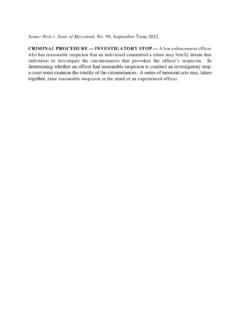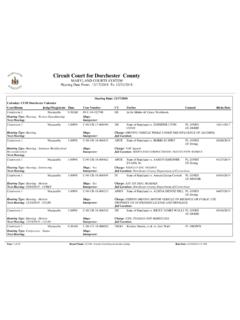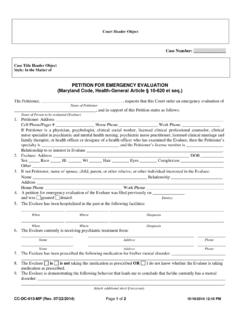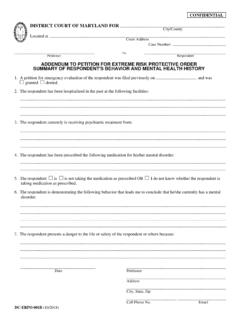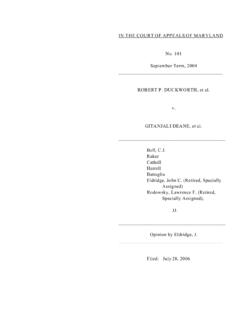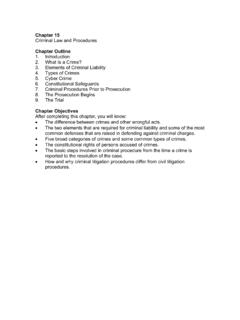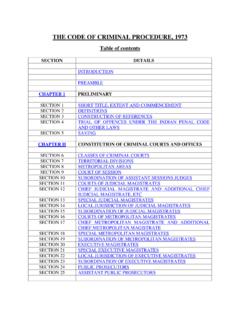Transcription of CRIMINAL PROCEDURE POSTCONVICTION PROCEDURE …
1 State of Maryland v. Travis Thaniel, No. 936, September Term, 2017 Opinion by Battaglia, J. CRIMINAL PROCEDURE POSTCONVICTION PROCEDURE INEFFECTIVE ASSISTANCE OF TRIAL COUNSEL: The right to the effective assistance of trial counsel is grounded in the Sixth Amendment, made applicable to the States through the Fourteenth Amendment. A claim of ineffective assistance of trial counsel comprises two elements: that counsel s performance was objectively unreasonable under prevailing professional norms, and that there is a reasonable probability that, but for counsel s unprofessional errors, the result of the proceeding would have been different. The petitioner bears the burden of proof.
2 CRIMINAL PROCEDURE POSTCONVICTION PROCEDURE INEFFECTIVE ASSISTANCE OF COUNSEL GENERALLY Strickland v. Washington PERFORMANCE PRONG: Judicial scrutiny of counsel s performance must be highly deferential; accordingly, a reviewing court begins with a strong presumption that counsel rendered adequate assistance and made all significant decisions in the exercise of reasonable professional judgment. The reasonableness of counsel s challenged conduct must be judged on the facts of the particular case, viewed as of the time of counsel s conduct. The petitioner must identify the acts or omissions of counsel that are alleged not to have been the result of reasonable professional judgment, whereupon a reviewing court must then determine whether, in light of all the circumstances, the identified acts or omissions were outside the wide range of professionally competent assistance.
3 CRIMINAL PROCEDURE POSTCONVICTION PROCEDURE INEFFECTIVE ASSISTANCE OF COUNSEL GENERALLY Strickland v. Washington PREJUDICE PRONG: An error by counsel, even if professionally unreasonable, does not warrant setting aside the judgment of a CRIMINAL proceeding if the error had no effect on the judgment. Ineffectiveness claims alleging a deficiency in attorney performance are subject to a general requirement that the petitioner affirmatively prove prejudice, defined as a reasonable probability that, but for counsel s unprofessional errors, the result of the proceeding would have been different. A reasonable probability, and, under Maryland law, its equivalent, a substantial possibility, is a probability sufficient to undermine confidence in the outcome.
4 That standard lies between, on the one hand, a showing that the errors had some conceivable effect on the outcome of the proceeding, and a showing by a preponderance of the evidence that counsel s errors affected the outcome. CRIMINAL PROCEDURE POSTCONVICTION PROCEDURE INEFFECTIVE ASSISTANCE OF COUNSEL GENERALLY Strickland v. Washington BOTH ELEMENTS MUST BE ESTABLISHED TO OBTAIN RELIEF: Because deficient performance and prejudice are elements of an ineffective assistance claim, both of which must be proven by a POSTCONVICTION petitioner, there is no reason for a court deciding an ineffective assistance claim to approach the inquiry in a specific order or even to address both components of the inquiry if the petitioner makes an insufficient showing on one.
5 If it is easier to dispose of an ineffectiveness claim on the ground of lack of sufficient prejudice, that course should be followed. CRIMINAL PROCEDURE POSTCONVICTION PROCEDURE INEFFECTIVE ASSISTANCE CLAIM BASED UPON FAILURE TO OBJECT TO STRUCTURAL ERROR: It remains an open question whether, under some circumstances, prejudice may be presumed where trial counsel s deficient performance has resulted in the procedural default of a structural error. In the specific case where that structural error is a violation of the defendant s right to a public trial through closure of the courtroom during voir dire, the Supreme Court has held that prejudice must be proven. CRIMINAL PROCEDURE POSTCONVICTION PROCEDURE INEFFECTIVE ASSISTANCE OF TRIAL COUNSEL FOR AGREEING TO THE CLOSURE OF THE COURTROOM DURING VOIR DIRE: In the instant case, trial counsel had a reasonable basis for agreeing to the closure of the courtroom during voir dire, given the evidence that trial counsel had acted, at least in part, to avoid a possible outbreak of violence between spectators sympathetic to his client and spectators sympathetic to the victim.
6 Therefore, the POSTCONVICTION court erred in finding that trial counsel had performed deficiently. Moreover, under Weaver v. Massachusetts, 137 S. Ct. 1899 (2017), rendered shortly after the POSTCONVICTION court s ruling but fully applicable to this case, the petitioner here has failed to demonstrate prejudice, whether measured under the usual Strickland standard or the alternative standard (whether the public trial violation rendered petitioner s trial fundamentally unfair) assumed in Weaver. CRIMINAL PROCEDURE POSTCONVICTION PROCEDURE ACT WAIVER: Under the Maryland Uniform POSTCONVICTION PROCEDURE Act, as interpreted by the Court of Appeals, a defendant may forego a broad spectrum of rights indeed, all rights that do not require a knowing and voluntary waiver which fall within the category of tactical decisions by counsel or involve procedural defaults.
7 CRIMINAL PROCEDURE POSTCONVICTION PROCEDURE WAIVER FREESTANDING CLAIM THAT CLOSURE OF THE COURTROOM DURING VOIR DIRE VIOLATED PETITIONER S RIGHT TO PUBLIC TRIAL: Because trial counsel affirmatively waived the petitioner s right to public trial during voir dire, the petitioner s POSTCONVICTION claim that his right to public trial was thereby violated is conclusively waived. CRIMINAL PROCEDURE POSTCONVICTION PROCEDURE INEFFECTIVE ASSISTANCE OF TRIAL COUNSEL FOR FAILING TO OBJECT WHEN THE TRIAL COURT AND COUNSEL ADDRESSED A JUROR NOTE IN PETITIONER S ABSENCE: In the instant case, trial counsel waived the petitioner s presence at a bench conference, during jury deliberations, at which court and counsel addressed a note from the jury.
8 Because Maryland Rule 4-231(c) expressly allowed trial counsel to do so, trial counsel did not act unreasonably in waiving the petitioner s presence. Moreover, the petitioner has failed to show that, had trial counsel ensured that he was present at the bench conference, there is a reasonable probability that the outcome of the trial would have been different. Accordingly, the POSTCONVICTION court erred in granting relief on this claim. CRIMINAL PROCEDURE POSTCONVICTION PROCEDURE INEFFECTIVE ASSISTANCE OF APPELLATE COUNSEL: The right to the effective assistance of appellate counsel derives from an amalgamation of the Due Process and Equal Protection Clauses of the Fourteenth Amendment. Generally, claims of ineffective assistance of appellate counsel are governed by the same test applicable to claims of ineffective assistance of trial counsel the two-prong test of Strickland v.
9 Washington. In the appellate context, a reviewing court assessing appellate counsel s performance must bear in mind that counsel is not required to argue every possible issue on appeal. Counsel need not (and should not) raise every nonfrivolous claim, but rather may select from among them to maximize the likelihood of success on appeal. To satisfy the prejudice prong, the petitioner must establish to a reasonable probability that, but for his counsel s failure to raise an issue, he would have prevailed on his appeal. As applicable to an ineffective assistance claim based upon the failure to raise an unpreserved issue, a petitioner would have prevailed on appeal only if the appellate court would have found plain error.
10 CRIMINAL PROCEDURE POSTCONVICTION PROCEDURE INEFFECTIVE ASSISTANCE OF APPELLATE COUNSEL FOR FAILING TO RAISE THE ISSUE OF THE TRIAL COURT S PURPORTED ERROR IN ADDRESSING A JUROR NOTE IN THE PETITIONER S ABSENCE: Because trial counsel did not object to the petitioner s absence at the bench conference at issue, any claim that the trial court erred in conducting that bench conference in the petitioner s absence was unpreserved. Although there is no hard-and-fast rule that appellate counsel has no obligation whatsoever to raise an unpreserved issue, it is nonetheless true that, under these circumstances, the petitioner bore a high burden he was required to show that there is a reasonable probability that the appellate court would have granted him relief on his underlying claim under the plain error doctrine.
